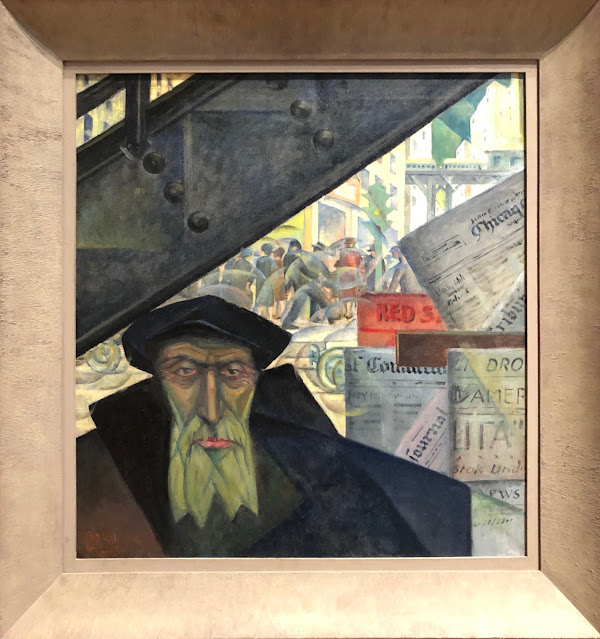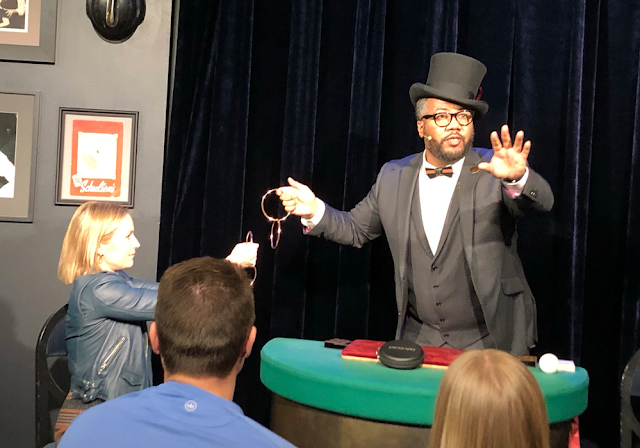 |
| "Strange Worlds" by Todros Geller (Art Institute of Chicago) |
Ukraine is never far from mind, as Russia redoubles its attack, hurling armies and missiles at the besieged nation, the second largest in Europe. I keep waiting for the world to shrug and look away—it's what the world does best. But we're still watching, horror-struck.
At the same moment, we're also rediscovering the depth of our Ukrainian heritage here in Chicago, sometimes hidden in plain sight: "Oh wait, Ukrainian Village. Right..."
Sometimes just hidden. I offer this little noticed oil in the possession of the Art Institute, "Strange Worlds," a 1928 oil painting by Todros Geller, a Ukrainian-born Jew.
The news vendor stares boldly at the viewer, red-eyed, gaunt, intense, tight-lipped. He's a man who has seen much, endured much, to get to his perch at a newstand jammed under an 'L' girder. In the background, the faceless pedestrians swirl past. If you look closely at the newspapers he's offering, they're a blend of nationalities and politics, crying for attention .
Geller was not only involved in art, but politics, religion, education—he taught both art and Hebrew.
Born in Ukraine in 1889, when it was still part of Russia, Geller recalled scarcely thinking of himself as Jewish, until the 1905 pogroms forced that understanding upon him. His family fled the next year, first to Montreal—where he met and became a proud friend of, "Red Queen" Emma Goldman—then Chicago, in 1918, where he studied at the School of the Art Institute.
Geller was often quoted or featured in the Daily News, whose comprehensive coverage of the Chicago art scene is heartbreaking to contemplate today.
"Todros Geller, who has been painting and studying in Europe and Palestine this summer has resumed his classes at the Jewish People's Institute," the paper noted in 1927. "Elementary
and advanced classes in figure and cast drawing, modeling, pottery, etchings, wood block
cutting and printing are offered."
During that trip he met with Marc Chagall in Paris—Geller was interested in what constituted "Jewish art," though it seems fairly plain nowadays. Later, the WPA sent him to the Southwest, where he did a series of sensitive portraits of Native-Americans.
His "Black Venus," a woodblock print of a nude cabaret dancer, was the talk of an unjuried 1932 show, scandalizing what the Daily News called "certain nervous nellies who had no business being where they were." That might have included the Tribune critic, who declared the work, "most startling."
In 1937, a Daily News reporter asked Geller how he squared the Biblical prohibitions against depicting the natural world with his career as an artist.
"Well you know," he replied, with a smile, and, the paper noted, no trace of an accent, "what happens when a law is passed against something that everybody wants to do."
"Strange Worlds" was taken as the title of a show of Geller's work that the Spertus Museum put on in 2018—you can see a brief WTTW segment on the artist and his work here.
Spertus holds many of the oils, woodblock prints, and sketchbooks of Geller, which is fitting, because he worked, unsuccessfully, toward creating a museum of Jewish art in the 1930s. In that era, Jews were sort of the officially-designated cultural outsiders, a role of The Other now filled by different groups. It made me wonder if there is still the sort of contemporary Jewish artistic community that Geller represented, or was it wiped away by the one-two punch of World War II and assimilation?










